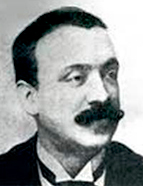

He specialised in naturalist novels — writings that would show a direct observation of nature and a rigorous analysis of the stories of real people, in a straightforward fashion that refrained from abstractions. Between 1901 and 1904, he published the 12 volumes of Tuberculose Social [Social Tuberculosis] with the aim of denouncing the vices and evils of society. Just like tuberculosis can attack any of the body's organs, so "morality can be tuberculous in any of its multiple and complex manifestations" ( Chibos [Snitches], 1901, p. 9). It was the writer's job not only to tell the sick about their illness, but also to show the healthy the causes of the disease and their share of the responsibility for spreading it.
He also dedicated himself to sensualist, licentious, erotic and pornographic novels, with explicitly sexual depictions and descriptions. These books sold by the thousands and were strongly advertised in newspaper (as "Books for Men" or "The Bachelor's Library").
A distinguished journalist and writer that was both highly regarded and spurned, Joaquim Alfredo Gallis was well known in Portugal and Brazil, and published around 35 books. Several volumes of erotic short stories were published in Brazil, where many bookshops had a genre called "Works by Rabelais". More than a dozen works were banned under the Estado Novo regime. In addition to Rabelais, he used the pseudonyms Antony, Baron of Alfa, Countess of Til, Duchess Laureana, Kin-Fó, Ulysses and Katisako Aragwisa.
In 1908, at the age of 49, he published the first of two volumes in continuation of the 3rd edition of História de Portugal. Popular e Ilustrada by Pinheiro Chagas, whom he called "master" (and which had already been continued by Barbosa Colen and Marques Gomes). To write the hot piece on the regicide, the publisher had chosen "a writer who is brilliant in form, thoughtful in his ideas, and independent, therefore impartial in his politics; a man who is fond of publications of this genre" ( História de Portugal (Complemento) …, p. 6). Gallis' identity was not revealed "so that he could deal more freely with the complex and varied issues that make up this reign" ( Idem ), which didn't stop him from emphasising his despair about politics — "that abject, low level, unqualifiable thing, with no moral elevation or social honesty, and lacking any brilliance or decency" ( Idem p. 8), and revolt against illiteracy and criticize King Carlos I's inaction, "who dedicated his time to worldly life more than adequate, and far less than he should to the affairs of the state" ( Idem , p. 10). The second volume (1909) was sold already signed.
This work is financed by national funds through FCT - Foundation for Science and Technology, I.P, in the scope of the projects UIDB/04311/2020 and UIDP/04311/2020.
